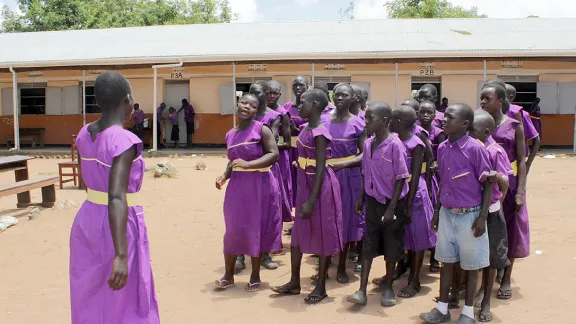
Gift leading the Child Rights Club at Boroli Primary School. In just two years she has become head girl of her school in the refugee camp and is leading her schoolâs Child Rights Club. Photo: LWF Uganda
“I hope to be part of the solution”
(LWI) - “I came to Adjumani with only the clothes on my back and just one Sudanese pound. I was 12-years-old, alone and afraid,” 14-year-old Gift Minzi says.
Today, the young girl lives in a foster family, has become head girl of her school in the refugee camp and is leading her school’s Child Rights Club.
Gift is one of many children who arrived at the refugee camp on their own. Registered as separated children - those who have lost their families during flight, or as unaccompanied minors (children who came without parents) - they are especially vulnerable to exploitation and neglect. Providing for them, finding and monitoring a suitable foster arrangement is part of The Lutheran World Federation work in the Adjumani refugee camp in Northern Uganda.
Gift’s life was not easy even before she was forced to leave her home. Born in the town of Nimule in the County of East Equatoria, South Sudan, she lost her mother at the age of seven. “When one loses a mother the only hope is to have a father,” she says. But the girl was neglected by her father and she never enrolled in school. From a very early age she learnt how to survive on her own.
The sight of killing something she will never forget
When violence erupted in South Sudan, Gift decided to make the harrowing journey from Nimule to Adjumani on her own, covering over 100km. While at home she feared for her life, she was uncertain of what to expect across the border in Uganda. As she fled with hundreds of other unaccompanied children, she witnessed the shooting of another young girl. Gift says she will never forget that moment.
In Adjumani, Gift was reunited with an aunt who enrolled her in school for the first time. The girl received support for school materials. Her well-being is monitored by LWF case workers and field extension staff, who regularly visit to see she is taken care of and well-treated. Although she was traumatized, she was able to embrace education. In a short period of time, she became one of the brightest students in Boroli Primary School and was selected as head girl. In this position, Gift takes on the role of peer educator, stressing the importance of education and urging girls to stay in school.
“Even before crisis strikes, girls tend to be the most vulnerable, a situation only exacerbated by disaster and conflict,” LWF Uganda program officer, Pius Kikomeko, says. “Despite the challenges of trauma, violence and abuse, each day, we are struck by their resilience, intelligence and enthusiasm.”
Taking their future in their own hands
Gift’s story reminds us that even in the most dire circumstances, girls around the world are initiating change, Kikomeko says.
Early this year LWF introduced Child Rights Clubs to several schools in the refugee settlements, such as Adjumani. Gift was quickly appointed chairperson of Boroli Primary’s Child Rights Club. Through drama and song, the club conveys fundamental messages relating to early marriage, child abuse, education and health.
Gift is particularly concerned about the falling number of girls at her school, many of whom she believes have been forced into marriage. She encourages her female peers to exercise their right to make informed choices and tries to create a safe environment for them to learn about sexual reproductive health and important life skills.
According to September 2014 statistics by the United Nations refugee agency, UNHCR, about 96,000 refugees have been settled in Adjumani District, Northern Uganda. Two thirds are children. At least three percent of these children were registered as unaccompanied or separated from their families. More than other young refugees, these children are vulnerable to exploitation, recruitment into armed forces and forced labour. Girls are especially in danger of being married off at a young age.
As Gift leads her group in song it is difficult to ignore her strong sense of presence, founded on her own experiences as a child. “I was not lucky to know my rights as a girl child, but this club can help others,” she explains. Gift feels that the club is helping her heal the wounds of a traumatic childhood. She hopes that by raising awareness other girls understand when their rights are being denied. Most importantly, they will know the right channels to report their grievances.
Gift’s leadership has not gone unnoticed. Dennis Andruma, a teacher in Boroli Primary School and patron of the Child Rights Club stresses the impact Gift has had on her fellow peers. “Not only is she a strong performer in the classroom, she is also a role model for the rest of the students, especially the girls. It will be my pride when she succeeds.”
What is next for Gift? “Nursing school,” she says. Even though she still has a few years of primary and secondary schooling left, she is confident that nursing is her passion. “I want to be able to help others. Hospitals here often do not offer the best care. So in the future I hope to be part of the solution.”
Contribution by Charnelle Etti, LWF Uganda


